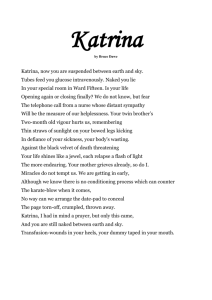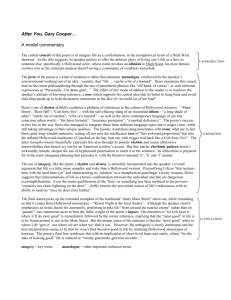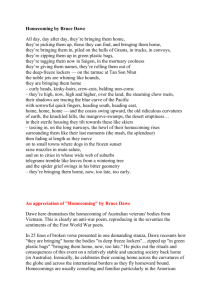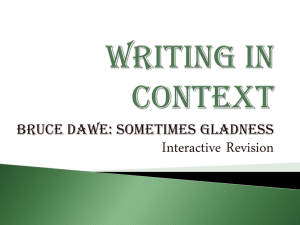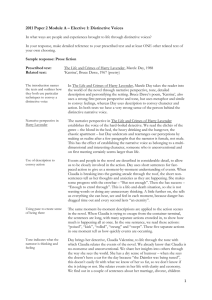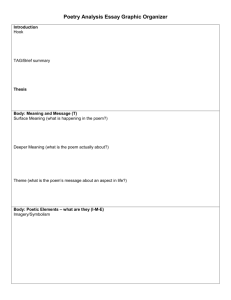The Formulaic Text: The Poetry of Bruce Dawe
advertisement
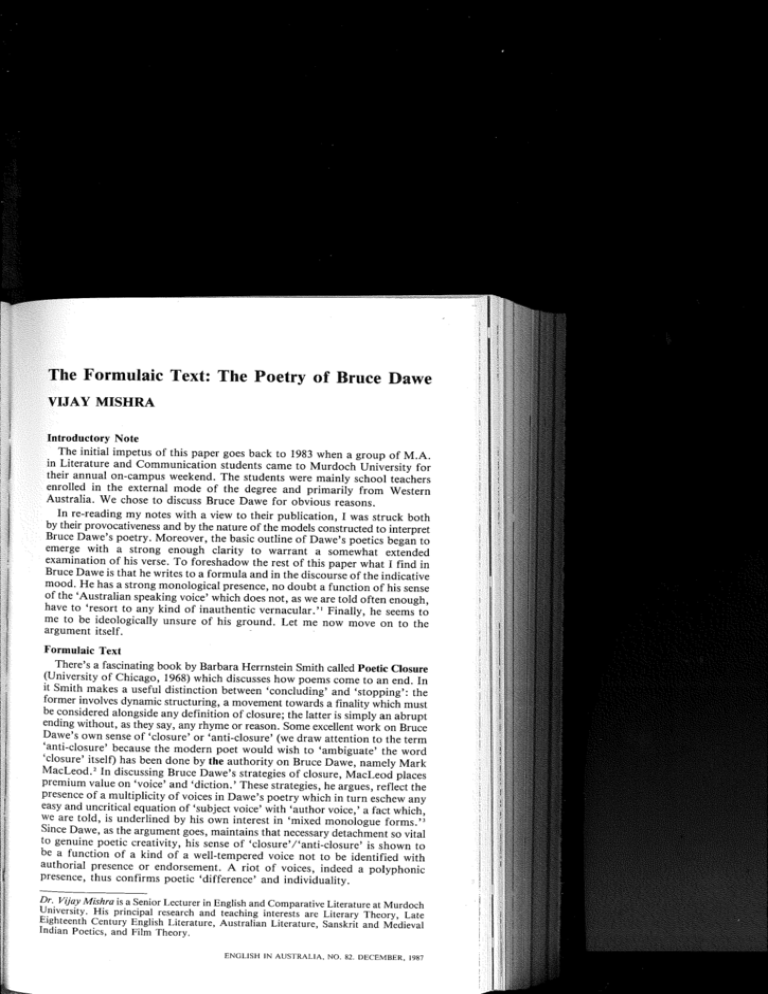
The Formulaic Text: The Poetry of Bruce Dawe
VIJAY MISHRA
Introductory Note
The initial impetus of this paper goes back to 1983 when a group of M.A.
in Literature and Communication students came to Murdoch University for
their annual on-campus weekend. The students were mainly school teachers
enrolled in the external mode of the degree and primarily from Western
Australia. We chose to discuss Bruce Dawe for obvious reasons.
In re-reading my notes with a view to their publication, I was struck both
by their provocativeness and by the nature of the models constructed to interpret
Bruce Dawe's poetry. Moreover, the basic outline of Dawe's poetics began to
emerge with a strong enough clarity to warrant a somewhat extended
examination of his verse. To foreshadow the rest of this paper what I find in
Bruce Dawe is that he writes to a formula and in the discourse of the indicative
mood. He has a strong monological presence, no doubt a function of his sense
of the 'Australian speaking voice' which does not, as we are told often enough,
have to 'resort to any kind of inauthentic vernacular.'' Finally, he seems to
me to be ideologically unsure of his ground. Let me now move on to the
argument itself.
Formulaic Text
There's a fascinating book by Barbara Herrnstein Smith called Poetic Closure
(University of Chicago, 1968) which discusses how poems come to an end. In
it Smith makes a useful distinction between 'concluding' and 'stopping': the
former involves dynamic structuring, a movement towards a finality which must
be considered alongside any definition of closure; the latter is simply an abrupt
ending without, as they say, any rhyme or reason. Some excellent work on Bruce
Dawe's own sense of 'closure' or 'anti-closure' (we draw attention to the term
'anti-closure' because the modern poet would wish to 'ambiguate' the word
'closure' itself) has been done by the authority on Bruce Dawe, namely Mark
MacLeod.' In discussing Bruce Dawe's strategies of closure, MacLeod places
premium value on 'voice' and 'diction.' These strategies, he argues, reflect the
presence of a multiplicity of voices in Dawe's poetry which in turn eschew any
easy and uncritical equation of 'subject voice' with 'author voice,' a fact which,
we are told, is underlined by his own interest in 'mixed monologue forms."
Since Dawe, as the argument goes, maintains that necessary detachment so vital
to genuine poetic creativity, his sense of 'closure' /'anti-closure' is shown to
be a function of a kind of a well-tempered voice not to be identified with
authorial presence or endorsement. A riot of voices, indeed a polyphonic
presence, thus confirms poetic 'difference' and individuality.
Dr. Vi)ay Mishra is a Senior Lecturer in English and Comparative Literature at Murdoch
University. His principal research and teaching interests are Literary Theory, Late
Eighteenth Century English Literature, Australian Literature, Sanskrit and Medieval
Indian Poetics, and Film Theory.
ENGLISH IN AUSTRALIA, NO. 82. DECEMBER, 1987
•
38
Vijay Mishra
I should like to offer both a reading of Bruce Dawe's verse and a variation
on 'poetic closure' by examining, initially, a concept so obvious and simple
but little discussed in critical/theoretical parlance. This concept relates directly
to the obverse of closure, namely poetic opening. I should like to argue that
the nature of Bruce Dawe's opening line underlines a pattern which is repeated
throughout Dawe's oeuvre. This pattern is what I call the 'formulaic text.'
Poetic Opening
Poems end, this goes without saying (or at least we hope it goes without
saying!). But poems begin too in ways in which a letter or, for that matter,
even a novel does not begin. If closures are marked by a certain formal
dynamism, then beginnings too dynamically anticipate the rest of the text. There
are two directions in which an opening line can go. It can either go 'before'
itself (in which case it does not exist with the text) or it can follow the normal
patterns of discourse and manifest discrete lines of development towards an
end. Its first impossible move (impossible because it is illogical) can only be
defended on inter-textual grounds: what other poems begin in this fashion?
how does this line negate an earlier opening? and so on and so forth. Its second
responsible mQve, that of growth and development makes the poem an organic
whole, an artistic 'monad,' a total aesthetic experience. Now all these are
essentially 'aesthetic' systems of categorization and we may find them overbearing especially since they suggest that 'closure' is related to the
'responsibilities' of openings to endings. So poems begin and end. Let us ask
ourselves the question, what are some of Dawe's opening gambits? My initial
strategy is to invoke a simple descriptive system which I borrow from traditional
grammar. Put very crudely, a discourse may be one of three types - imperative,
indicative or interrogative. In other words, it either commands ('You men there,
keep those women back' 38),' states ('To be a poet in Australia/is to live in
Echo Valley' 199) or questions ('How could I ever be found?' 106). Apart from
some other obvious opening lines such as ' "Which one's the dog?" you find
yourself saying' (83) and 'What are three little countries in a world like ours?'
(168), which are, it seems to me, highly ambiguous interrogatives in the first
instance, Bruce Dawe almost invariably favours the indicative. In view of this
it would be best if, for the moment, we dispense with the other two types and
examine the range and implication of what we may now call 'indicative
discourse.' As a mood of 'statement,' the indicative is a highly complex system
capable of generating an exceptionally complex set of utterances. 5 Indeed, entire
texts are constructed around the indicative and even when the grammatical forms
of the 'interrogative' and 'imperative' exist within these texts they are perforce
'naturalized' into statements. Very generally, then, the indicative dimension
.undergoes the following transformations in Dawe's poetry.
Address. In its various forms this opening generates poems with straightforward
narrative and a recoverable matrix. 'Speak to him' (69), 'You're the accused'
(65), 'You men there' (38) constitute one type of 'address' (type A). The other
(type B) is much more personal with a greater identification of subject-voice
with addressee-voice. 'Katrina, now you are suspended' (78), 'Dear one, forgive
my appearing before you' (74), 'Okay Uncle Arthur let's go' (205) while not
being true imperatives (in fact type A too does not require the addressee to
ENGLISH IN AUSTRALIA. NO. 82. DECEMBER. 1987
The Formulaic Text
39
follow any command/direction), nevertheless have the characteristics of
'address.' But since pure imperatives (as commands) cannot generate the kinds
of poems Dawe writes - poems in fact of liberal humanism - the imperative
is thus simply a ploy (a gambit?) which is effectively bracketed with the
indicative. 'Pure' imperatives (go, kill, murder, scream, etc.) require a
vehemence quite at odds with the subdued, semi-detached voices endorsed by
the poet.
Temporality. By 'temporality' I simply mean a poetic opening which 'conjoins'
a time market ('when,' 'last night'), a space marker ('at the Wonchip crossroads'), a spatia-temporal marker ('at Shagger's funeral,' 'On the train rolling
north,' 'Looking down from bridges,' 'Every summer we construct the sea')
with an incident either as a personal reverie (recollections in solitude, the mark
of the artist in isolation) or, in the virtualite of adverbials ('when' is extremely
ambiguous), as a projected occurrence or, finally, as a metaphorical expansion
of the semantic field opened by the first line. So on the latter score, we read
'When something like this happens, ... it is like falling in love,' where 'like
falling in love' predicates, metaphorically, a further evasion of what this
something is. Metaphors 'defer' meaning and the essence of poems of this kind
is indeed an endless deferral of meaning. This, of course, doesn't mean that
closure becomes irrelevant; rather poetic closure must not be confused with
a 'closed text.'
Didactic. Didactic openings are not uncommon in fiction. Recall Anna Karen in
('All happy families are alike but an unhappy family .. ') and Pride and
Prejudice ('It is a truth universally acknowledged, that a single man in possession
of a good fortune ... ')in this context. And didactic openings -defined very
generally here as openings with a 'universal under-pinning,' the sort of discursive
style one readily equates with moral claims or judgements - are not unusual
in poetry either. Often didactic openings presuppose the genre of allegory and
one of the best known examples of this type in Australian Literature at any
rate is A.D. Hope's 'For every bird there is this last migration' ('The Death
of the Bird'). Like other 'opening' types, didactic ones too generate a particular
kind of narrative structure. Bruce Dawe's 'The man has need of the dog' (184)
clearly forges ahead into the world of allegory. Similarly, 'Beasts mourn for
beasts' (193) must invoke comparisons with man, either in some extended form
or simply as a point of reference. What I'm really saying here is that the principle
of generation is linked to poetic openings. In other words, the overall narrative
of the text is conditioned by the opening discourse. Bruce Dawe does not use
didactic openings too often but some of his other openings, especially those
in which comparisons are made ('epic' beginnings as we may wish to call them)
have the capacity to generate poems which are similar in tone and substance
to those with a more central didactic opening. 'Like the murderer on the far
bank' (181), 'Love, like trouble, steps out' (191) and even 'To be a poet in
Australia' (199) may be included here.
Self-as-subject. Finally indicative discourse also incorporates openings about
the self, especially those in which the 'poetic' voice often coalesces with the
poet's voice. Here Ilwe follows a narrative of self unfolded in verse. 'I am
ENGLISH IN AUSTRALIA, NO. 82. DECEMBER, 1987
¥
40
Vijay Mishra
a part of this bull-neck civilization' (166), 'I never walked abroad in air' (190)
and 'Every summer we construct the sea' (196) either begin poems of
autobiographical projection/suppression or, through a certain detachment,
become riddle-like verses to be deciphered again through the conventions of
allegory. The latter, however, do have a tendency to relapse into sentimentality,
mawkish voices concerned with the unknown, other, heroes of humanity. This
category, of course, is not meant to exclude poems with 'didactic,' 'temporal'
and 'vocative' openings for all those categories, regardless of the form the
narrative takes, have 'voices' and it is the special position of the voice
(ideological, linguistic, etc.) that allows us to construct point of view and,
ultimately, meaning.
With an analysis of this kind it is possible to make certain very general claims
about Dawe's verse. • Apart from the obvious question of the particular kind
of discursive practice adopted by the poet (here he is primarily an author of
the 'indicative mood' who writes to a formula) it is possible to say other things
about his technique. Before examining Dawe's verse in some detail, let us,
provisionally at any rate, make some claims about Dawe's poetics. Dawe's
poems are essentially narratives and, unlike many other poets with whom he
shares significant affinities (notably Emily Dickinson and e.e. cummings) he
writes extended narratives. There is nothing 'truncated' about Dawe's narrative
structures; he gives them elaborate beginnings, middles and ends. Given this,
Dawe's verses obviously hit a chord in the common reader. Now 'accessibility'
and 'readability' may be interpreted as poetic strengths if one wishes to consider
questions of 'directness' and so on, or they may be read as weaknesses if one
were to say that they eschew retroactive readings. Simply put the fear is that
one need not go beyond a minimal reading of a Dawe poem to construct its
meaning. 7 The more conceptually useful point I'd like to make about Dawe's
poetics, however, is that his verse is written to a strict formula. This formula
may be summarized as awareness and/or perception followed by recollection.
An opening with a spatio-temporallocation is thus favoured over others. This
'location' may either be in the simple present ('Why, in this strange and beautiful
land' (170)), in the eternal present ('All day, day after day' (92)) or in the future
present ('When you are older' (219)). But 'when' is highly 'polysemic' too for
it may be used to indicate a process: 'When Greek women drop a piece of bread'
(164). In this case 'when' is a marker of something whose force resides in it
being habitual. So 'when Greek women drop a piece of bread' ... 'they kiss
it.' We may simply call this technique 'recollections,' which conform to the
rules already referred to above and (b) Temporality.
I should now like to examine four poems chosen more or less at random.
My aim in the second half of this essay is to relate my general observations
to actual practice.
Text A: 'Widower' (131)
The poem has a classic Dawe opening: 'when' followed by the consequences
of whatever went before 'when'. One function of the 'when' syntax is to generate
consequence. And so the poem proclaims its interest in what happens to people
after a massive chapter of their life has come to an end. The poem is very
ENGLISH IN AUSTRALIA, NO. 82. DECEMBER, 1987
The Formulaic Text
41
readable (as most of Dawe's poems are) because there is no evasion of the normal
narrative flow, so much so that both story and plot - real, historical time and
narrative time - for a while become one. In other words the temporal unfolding
of the narrative in the text is identical with its real unfolding in time. Texthistory is equivalent to 'real' history. What do I mean by words which, though
common enough, in this context seem to invite complex responses from you?
Well, what I am getting at is that the narrative of the 'Widower' can be
recuperated upon a first minimal reading of the poem. After some event
(conversations in the house, after a funeral perhaps) someone (who is not the
persona since that voice is clearly with the narrator) in the evening closes the
front door, walks down the 'long hall,' 'past the closed room' and out into
the garden. There, alone, he notices the 'peaches' and rubs thyme 'between
thumb and forefinger' a gesture which Grace and Caroline Bell too, we recall,
enact while watching the veterans march on Anzac Day. 'Thyme' in this instance
is replaced by another herb, 'rosemary.''. As night falls, amidst the whirring
of insects, he re-enters the house with the wind howling/creaking all night. This
then is what may be called the story line. There is a simple 'matrix sentence'
- something like 'the widower is lonely' - which gets transformed into a
narrative structure. Here, in this narrative, nostalgia, remembrance and loss,
get transformed into metaphors of loneliness. But is there something else we
can say about the poem? In other words, is the text in fact identical with the
minimal reading we have offered? Can paraphrase in short replace the text?
Is 'meaning' identical with 'significance?' To discover poetic 'significance' we
must follow closely those 'moments' in a text which defy easy, natural semantic
actualization. It is through these resistances that a text emerges as a unit of
'significance.' Poetic 'significance' is thus a question of semiosis, of fractures
in representation or mimesis. This is because the mimetic orientation of a poem
(constructed through a system of referentiality) is always destabilized at some
point in the poem. It is this point of instability which leads us to the second
level of reading and to the construction of poetic significance. • Can we,
therefore, find instances in the text where our naturalization of poetic
representations are questioned?
(a)
(b)
the sheeted quietness,
. . .. where, hours on end, the wind
Creaked like an ageing bachelor whose bed
Appears too narrow and too small for him
With the whole world in which to lay him down.
I choose these examples because in our narrative re-construction we avoided
incorporating them. The first, 'the sheeted quietness,' tends to predicate 'the
closed room,' suggesting that this room is 'in' sheeted quietness. Now since
only connotation can take us beyond this descriptive statement, we must read
the phrase figuratively. We could read it as a metaphor but I think we will
be more precise if we read it as a metonym of death. 'Sheeted quietness' gives
a dimension of meaning to the 'closed room' which takes us back to the opening
line, and beyond that to the title of the poem. There is, naturally, a certain
'ghostliness' about 'sheeted,' a silence which permeates the first stanza of the
ENGLISH IN AUSTRALIA, NO. 82. DECEMBER, 1987
42
Vijay Mishra
text. Sound jars consciousness, and sound must be avoided at all cost. And
so the shrilling noise 'Of the glass in the left-hand pane' is carefully forestalled
and a series of negations/suppressions strengthen this silence. The 'loosenin~
shadows of the evening,' the 'long hall,' 'rubbed automatically,' 'stock-stili,'
'darkness,' 'indifference,' 'asks no questions,' all these expressions avoid contact
with noise. Questions are not asked, for questions begin dialogue and dialogue
begats endless chatter/noise. This ghostly sombreness, the widower's sense of
final loss, is punctuated by a noise which has the automatism of a camera
clicking. But cameras are clicked (by someone of course) to 'freeze time,' insects
'whirr' to break the 'freeze,' to bring movement, to defy stillness. Cameras,
need I say, reinforce stillness by giving false permanence to a mental image
which is never fixed. So it is then that the object in the text 'unfreezes' and
goes 'back into the house.'
At this point what we would habitually equate with the widower's own sense
of disorientation, is transferred to the wind. The final three lines are an extended
metaphor (not a metonym ) of the creaking wind. Grammatically, the
protagonist's narrative stops at the point of entry into the house. A shorter,
fragmentary narrative, supersedes the dominant narrative and, in formal terms
at any rate, is independent of the latter. This is, of course, poetic mimesis which,
unlike other forms of representation (the poem thus far), propsoes to show
through 'transfer' (a kind of a dialogue between discourses, a 'talking cure')
the kind of poetic significance which the text achieves and which turns the final
lines into a paradox: the play on the narrowness of the bed. The move from
the 'widower' to the 'ageing bachelor' is mediated by the 'wind' creaking 'like
an ageing bachelor.' At this point resistance to casual naturalization, the easy
illusion of a minimal narrative, foregrounds itself and subverts the paraphrase.
Who, we ask, 'lays him down?' Paradox defies any easy resolution and in doing
so warns us that poetic closure does not mean reduction of verse to one meaning.
We've isolated two points of resistance in the text to show what, finally, enables
the text to operate at a second level and this may be called its significance.
Once the second order of meaning has been isolated, the text ceases to 'mean'
what the narrative suggests it does mean; instead the text, momentarily at any
rate, becomes a unit of significance where all details, all 'ungrammaticalities'
(like the final line for instance) merge into one. Before we can comment on
Dawe's technique further, let us examine our second poem .
Text B: 'The Frog Plague' (80)
I've suggested in my analysis of Text A that a text is a transformation of
a matrix sentence. Now you may find this a 'reductionist' ploy but I think the
device may be of great use in our analysis. It is, therefore, with the matrix
sentence of 'The Frog Plague' that I wish to begin this section of my analysis.
'Civilization and barbarism': I advance this as the matrix 'sentence.' I should
now like to follow its poetic transformation. The opening line, again in the
indicative is what I have called 'spatia-temporal.' It is 'In stagnant pools, by
disused tennis courts,' in these areas (and, of course, in similar ones elsewhere)
that 'Time breeds us mediocre monsters.' A first reading stops here because
already we have an ambiguous line. We, therefore, casually disambiguate:
ENGLISH IN AUSTRALIA, NO. 82. DECEMBER, 1987
The Formulaic Text
43
(a)
Time, the subject, breeds us (who are) mediocre monsters
where 'us' is mankind
(b)
Time, the subject breeds us (who are) mediocre monsters,
where 'us' is 'mediocre monsters' (i.e. frogs)
(c)
Time, the subject, breeds for us (i.e. mankind) mediocre
monsters (i.e. frogs)
The third line of the poem clearly endorses interpretation (c) and, also, allows
for the construction of an easier narrative. And this, of course, is readily seen.
Within a primarily descriptive system the poetic persona simply catalogues the
habitat of frogs and man's singular revulsion towards them. Our own summary
corresponds, in intent at any rate, quite closely to the poetic description given
by Dawe. But again, if the equivalence were one to one, why write poetry?
If, in other words, a prose summary could displace the original poetic text,
why analyse verse? We must return to our earlier claims. Up to a point this
naturalization is possible and even permissible, and in this poem the easy
recuperation of the description with most of its immediacy intact can be stretched
further than in many other poems of Dawe. But there is already something
crudely formulaic about Dawe's poetic style. Only towards the end of the poem
(vide 'The Widower') is poetic mimesis (the system of poetic referentiality we
have reduced to a paraphrase) threatened through the insertion of the symbolic.
It is this symbolic form of representation (the kind of line(s) that readily enters
allegory) which resists habitual interpretation.
- Baggy amphibians play a sombre chess
And in at the bright window something gapes.
Natural language (the primary modelling system) rejects outright 'baggy
amphibians play a sombre chess' for, quite clearly, frogs do not play chess.
But we know that 'chess' is symbolic of life itself and in many literary/filmic
texts (in Bergman's The Seventh Seal for instance) the Devil plays chess with
man. So the considerable semantic field of the game of chess gives 'baggy
amphibians' a power in excess of their 'real' value. It is the way in which 'life'
(defined as fully as we can) revolves around these amphibians (that it is us and
not them who are being hunted) which creates a primary paradox in the poem.
Here again 'meaning construction' leads us finally to poetic significance and
we have to re-read the text to find the specific ironic discourse which sustains
this deft move on the part of the poet. I have given the impression that this
line almost saves the text from becoming 'undergraduate.'Io I think there is
some truth in this, especially as our analysis also unmasks the classic Dawe
technique: a 'natural' language given a twist at the end. This twist is invariably
paradoxical, aimed at subverting the easy identification of word and meaning
(more accurately signifier and signified) in the text. I've used the word
'formulaic' to describe this. Can we defend ourselves any further?
Text C: 'Homecoming' (92)
A sense of unending (and even futile) activity hits us as we read this elegy,
for many the 'one outstanding poem' that the 'Vietnam War produced. 'II No
unfamiliar names are mentioned except for the strange sounding 'tarmac at
ENGLISH IN AUSTRALIA, NO. 82. DECEMBER, 1987
44
Vijay Mishra
Tan Son Nhut' (Tan Son Nhut, Saigon International Airport means literally,
'newly painted') or 'the hulls of Grants.' Time too is 'all day,' and 'movement'
hides pity, fear, rage or agony. The poem has a quick tempo, it doesn't wish
to ruminate on events and rushes headlong, almost geographically, from Saigon
to Australian towns, cities and suburbs. 'Bringing the dead home' (the matrix)
is presented through an activity which avoids direct human contact. We can
quickly see the pointlessness of the entire war and those of us familiar with
the late sixties and early seventies moratorium marches respond to the poem
with an unusual immediacy. But what more can be said about it beyond its
quite obvious didactic force? Where are the resistances? How does it challenge
'natural' modes of representation? Again we return to the formula: an initial
extended reflection followed by an essentially metaphorical discourse which
almost invariably heralds a paradox:
and on to cities in whose wide web of suburbs
telegrams tremble like leaves from a wintering tree
and the spider grief swings in his bitter geometry
-they're bringing them home, now, too late, too early.
The tendencies we discovered in the other poems are evident here too. Only
towards the end does the poem resist easy naturalization and proclaim a
paradox. The grief so disconcertingly absent from the poem so far gets a
poignant expression in perhaps the best two metaphors in the entire poem:
'telegrams tremble ... bitter geometry.' But since the poem clearly carried a
particular ideology, an ideology basically of the futility of our involvement in
Vietnam, it is the final line with encapsulates the paradox of that involvement:
- they're bringing them home, now, too late, too early.
'Too late, too early'; yes 'too late' because they're dead but why 'too early?'
Is Dawe endorsing, finally, the political necessity of 'our boys' being there?
Or is he being ironic, the mode that we detect in 'The Frog Plague'? Or finally,
is the nation not prepared for the return of the dead, to be buried in forgotten
suburban graveyards? So 'too early,' at this slightly cynical ideological level,
worries us because the return may be deemed 'dishonourable'; they bring back
with them the shame of defeat - and grief, ultimately, feels terribly
uncomfortable with shame. But my aim here has not been to examine Dawe's
humanistic ideology, what Alexander Craig many years ago called 'this poet's
warm humanity';" rather I am concerned with Dawe's poetics as a particular
form of expression. And here again, from the opening line, which conforms
to the classic pattern of the indicative, to the paradox at the end, Dawe writes
within a well-established formula of 'recollection' and 'resolution.'
Text D: 'Creative Process' (217)
If we reduce this to its underlying narrative what we get is really a fable.
It seems to me that the narrative underpinning of this text belongs to the genre
of fable and it is the conventions of this genre which control the way in which
it is written. A moral fable often has a protagonist who is foolish and the
question of folly is raised to new heights through a specific instance of the
protagonist's foolishness. In this poem 'we' the plural protagonist suitably
ENGLISH IN AUSTRALIA, NO. 82. DECEMBER, 1987
The Formulaic Text
45
hidden behind a pronoun yet so patently naked, enacts a particular narrative
(because this happens yearly) simply to underline this folly. One of my worries
with this poem is that apart from the moral question/issue raised at the end
of the poem, we hardly ever go beyond the minimal narrative. Beginning with
a 'temporal' opening (one of Dawe's favourite opening gambits), the poem
moves briskly through a predictably Australian 'climatic' register. Indeed the
force of the rain/drought alternation and our habitual responses to this extreme
alteration are so marked that the 'we' is easily invaded by, or collapses with,
a mythic national consciousness. In the process 'fable' becomes an 'allegory.'
But beyond this identification, beyond the metaphors which give us this sense
of unmediated recognition, what we get is really a fable of relentless human
folly. 'Relentless' because there is a certain inevitability about it. In this case
the entire narrative becomes 'metonymic~; it is a fragment that displaces all
our prejudices, and indeed all our actions in life. The lack of gratitude, the
absence of generosity, these the poem represents through a narrative of 'rain'
and 'drought.' The crucial lines are:
-- how petty and arrogant seems our previous boredom,
how just a punishment seems our present drought!
The poem begins with 'when the drought breaks' and ends with 'our present
drought,' bringing beginnings and ends together, establishing the necessary
artistic concordance. But our 'present drought' may be read either as our 'gift
of drought' or the 'drought which is here with us now.' 'Punishment,' 'present,'
reinforce the first meaning and carry echoes of 'previous.' What we get here
again - through the necessity of the symbolic - is a specific kind of poetic
closure, one that we associate with fables: narrative followed by didactic
discourse. It is my contention that this is Dawe's predominant technique, it
is a trick, a gambit, a favourite ploy. Bruce Dawe writes humanistic fables."
Conclusion
It is perhaps unwise to claim so boldly that Bruce Dawe writes to a formula
and is almost alarmingly predictable. Yet it seems to me that the almost total
absence of the 'interrogative' - the mood of question - finally leads Dawe
to write versions of what are clearly minimal realistic texts. These texts have
a narrative, often extended ones and these texts move towards the expression
of a particular point of view which is invariably couched in a moral of some
kind. If there are voices, they do not shift significantly from poem to poem.
A powerful enough second voice to counteract the poem's first dominant voice
too is generally absent. I( read Dawe as a poet who espouses all the decent
values of civilization, who is, if one wishes to give him a political tag (which
poets detest) a 'social democrat.' 14 But social democracy does not lead,
necessarily, to poems of great imagination and power. And ultimately it is the
fear of the unknown and the consequences of radical changes which subdue
Dawe's voice(s). And, furthermore, it is precisely this that prevents him from
the kinds of linguistic experimentation which could lead to a re-examination
of poetic representation. There is too easy an acceptance of the 'naturalness'
of language here; and a corresponding timidity towards fracturing language,
to make it speak afresh, to find a 'purer' style. Dawe clings on to the concepts
ENGLISH IN AUSTRALIA, NO. 82. DECEMBER, 1987
46
Vijay Mishra
of narrative closure, to in fact 'fables of identity.' In doing so his poems are
written in one dominant discourse - the discourse of his opening lines, the
discourse indeed of the indicative. This discourse accepts the referential power
of language and metaphors' abiding grace (after all the collection under
discussion here is called 'Sometimes Gladness,' a partial phrase which invites
theological completion). It accepts furthermore the naturalness of order and
history.
This being so, Bruce Dawe must now tussle with the tyranny of language
itself, and engage in the ideological consequences of that encounter.
Notes
1. The Oxford History of Australian Literature, p.419.
2. Mark Macleod, 'Bruce Dawe and the Americans,' Australian Literary Studies, IX
(October 1979), 143-55 and 'Bruce Dawe and Frank Sargeson: Speaking in Other
Voices,' Australian Literary Studies XII (May 1983), 3-13. For au earlier study of
Bruce Dawe see John Wright 'Bruce Dawe's Poetry,' Westerly 1 (1974), 36-44.
3. Bruce Dawe, 'Public voices and private feeling,' in Joan Kirkby (ed) The American
Model. Influence and independence in Australian poetry (Sydney: Hale and Iremonger,
1982), p.172.
4. Numbers in brackets refer to appropriate pages in Bruce Dawe, Sometimes Gladness
'
Collected Poems, 1954-1982 (Melbourne Longman Cheshire, 1983).
5. See J .L. Austin, How to do Things with Words (Oxford: Clarendon Press, 1962).
6. For Bruce Dawe's own ideas on the subject see 'Bruce Dawe' (Australian Poet in
Profile), Southerly XXXIX, (1979), 355-63 and Greg Shepherd. 'From Garden State
to Garden City: The Progress of Bruce Dawe,' English in Australia, 74 (December
1985), 26-28.
7. See also Pamela Law, 'Raining Down Meaning: The Poetry of Bruce Dawe,' Southerly
XXXIX (1979), 192-203 and Philip Martin, 'In the Matter of Law v. Dawe: Case
for Defence,' Southerly XXXIX (1979), 355-63.
8. Shirley Hazzard, The Transit of Venice (Harmondsworth: Penguin, 1981), p.36.
9. I follow Michael Riffaterre, Semiotics of Poetry (London: Methuen 1980) here. See
also Vijay Mishra, 'Text, Textuality and Interpretation: An Interview with Michael
Riffaterre,' Southern Review XVIII, I (March, 1985), 109-119.
10. Chris Wallace-Crab be uses the phrase 'one-shot poems' to describe poems which are
basically 'analogical.' See 'Bruce Dawe's Inventiveness,' Meanjin XXV (1976), 94-101.
11. The Oxford History of Australian Literature, p.425.
12. Twelve Poets 1950-1970 (ed and intr) Alexander Craig (Milton, Qld: Jacaranda Press,
1971), p.7.
13. With a slightly different emphasis a similar claim is made by John Hainsworth in
'Bruce Dawe,' Australian Poems in Perspective (ed) P .K. Elkin (St. Lucia: University
of Queensland Press, 1978), 203-13.
14. ' ... Dawe's is the most democratic voice in Australian poetry,' writes Vincent
O'Sullivan in a recent review of Sometimes Gladness. See Westerly 1 (March, 1985), 88.
ENGLISH IN AUSTRALIA, NO. 82. DECEMBER, 1987

